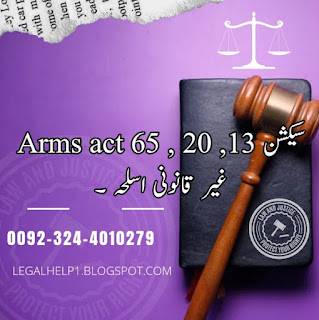What is Section 13 20 65? | Is 13 20 65 bailable?

13 20 65 arms act Is 13 20 6 bailable? Is 13 , 20 , 65 Arms act is Bailable No 13 20 65 is none Bailable offence. Title: Unveiling Pakistan's Arms Act: A Closer Look at Sections 13, 20, and 65 Introduction: The Arms Act in Pakistan stands as a crucial legal framework governing the possession, use, and trade of firearms and ammunition in the country. Within this legislation, Sections 13, 20, and 65 play pivotal roles in delineating regulations related to licensing, possession, and penalties for violations. Understanding these sections is essential for ensuring public safety and promoting responsible firearm ownership. Section 13: Licensing of Firearms Section 13 of Pakistan's Arms Act addresses the process and criteria for obtaining licenses for firearms. It stipulates that individuals wishing to possess firearms must apply to the designated licensing authority, typically the Deputy Commissioner or District Magistrate, depending on the jurisdiction. The application process invo...
